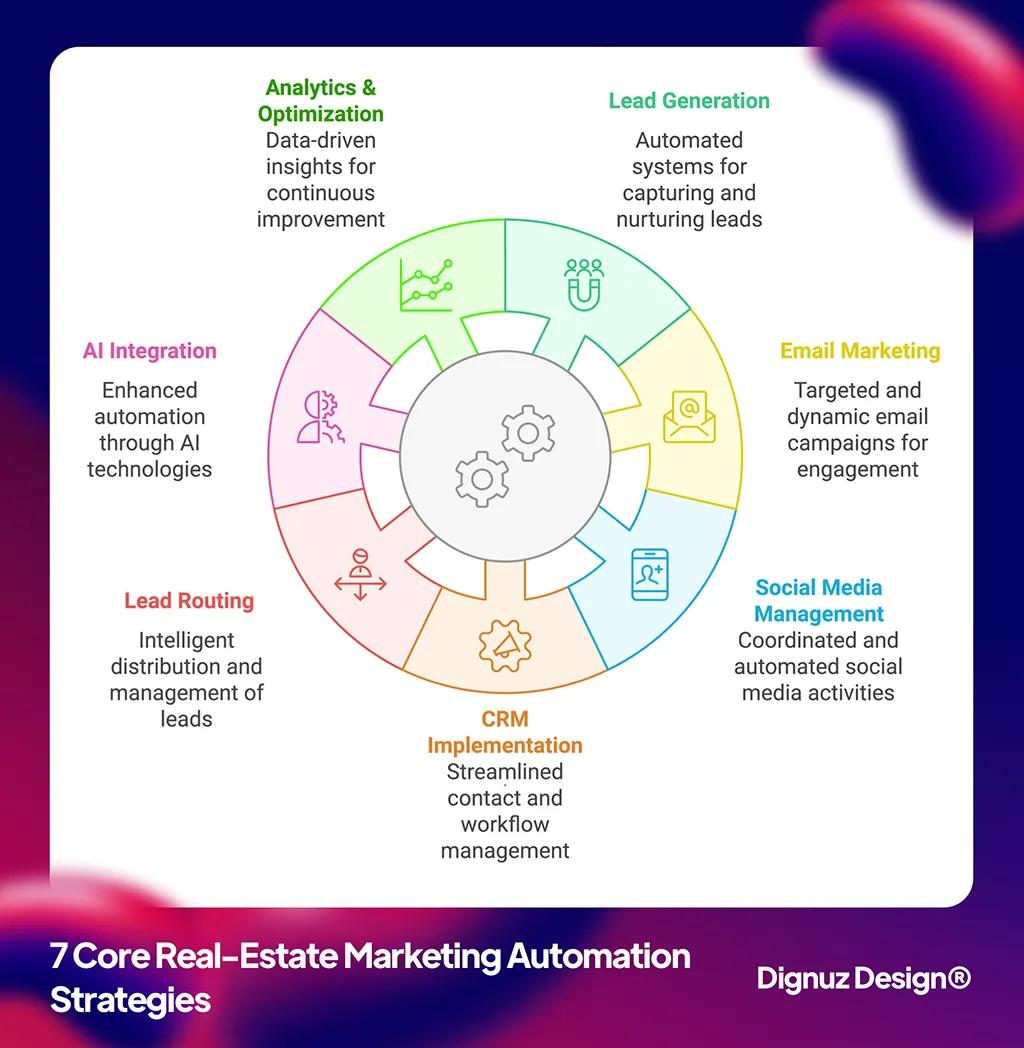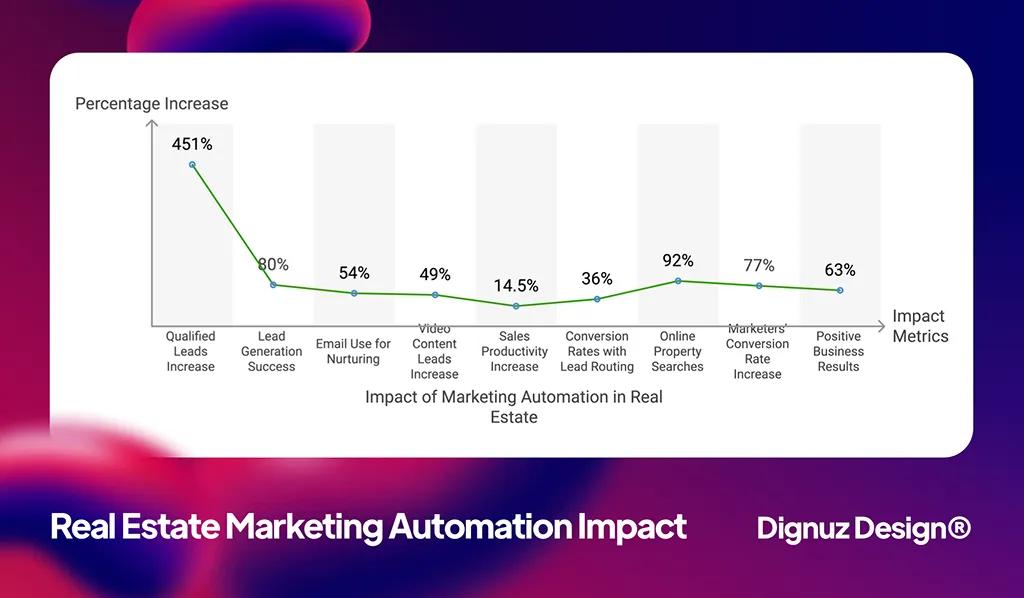7 Game-Changing Real Estate Marketing Automation Strategies That Actually Work

Real estate marketing automation transforms property professionals into efficiency powerhouses. Businesses implementing marketing automation experience a remarkable 451% increase in qualified leads (Source: Grapevine Group). This dramatic improvement stems from automated systems that capture, nurture, and convert prospects while you focus on closing deals.
Marketing automation streamlines repetitive tasks, enhances lead quality, and maintains consistent communication with potential clients. For real estate professionals, this means more time showing properties and less time managing marketing campaigns. Successful real estate development marketing now depends on strategic automation.
The real estate sector faces unique challenges in lead generation and client communication. Manual follow-ups, inconsistent messaging, and missed opportunities cost agencies valuable deals. Automation solves these problems by creating systematic approaches to client engagement and lead nurturing.
These seven automation strategies help real estate agents stand out in their market. Each strategy focuses on practical implementation, measurable results, and scalable solutions. From lead generation to analytics optimization, these approaches transform how real estate professionals manage their marketing efforts.
Inconsistent Lead Follow-up
- Automation Solution: Automated Response Systems
- Business Impact: Improved Response Rates
Manual Data Entry
- Automation Solution: CRM Integration
- Business Impact: Enhanced Efficiency
Scattered Marketing Efforts
- Automation Solution: Unified Automation Platform
- Business Impact: Consistent Brand Message
1. Automated Lead Generation and Nurturing Systems
Automated lead generation systems capture and nurture potential clients 24/7. Implementation of marketing automation results in an 80% increase in lead generation success (Source: Salesmate). This systematic approach transforms casual website visitors into qualified prospects through strategic automation.
Setting Up Effective Lead Capture
Successful lead capture starts with strategic placement of automated forms throughout your real estate website. These forms integrate directly with your CRM system, creating seamless data collection and organization. Focus on capturing essential information while maintaining a low-friction user experience.
Create targeted landing pages for specific property types or neighborhoods. Each page should include professionally designed property showcases with automated capture forms. This targeted approach increases conversion rates by matching content to visitor intent.
Implement smart forms that adapt based on visitor behavior. These forms remember returning visitors and request additional information progressively, building comprehensive prospect profiles without overwhelming potential clients.
Implementing Drip Campaigns
Design automated email sequences that nurture leads based on their specific interests and behaviors. Create distinct workflows for buyers, sellers, and investors. Each sequence should deliver marketing messages that resonate with their unique needs.
Structure your drip campaigns with these essential components:
- Welcome sequence introducing your value proposition
- Property alerts based on saved searches
- Market updates and neighborhood insights
- Investment opportunity notifications
- Open house invitations and viewing schedules
Monitor engagement metrics to refine your automation sequences. Track open rates, click-through rates, and conversion points. Use this data to optimize message timing and content relevance.
Welcome Series
- Automation Trigger: Initial Sign-up
- Expected Outcome: Brand Familiarization
Property Alerts
- Automation Trigger: Search Preferences
- Expected Outcome: Viewing Requests
Market Updates
- Automation Trigger: Location Interest
- Expected Outcome: Market Education
Integrate your lead generation system with property listing updates. This automation ensures prospects receive immediate notifications about new properties matching their criteria, maintaining engagement through relevant, timely communication.

2. Strategic Email Marketing Automation
Email marketing remains a cornerstone of real estate communication, with 54% of real estate professionals using email to nurture long-term relationships (Source: Halo Programs). Strategic automation transforms standard email communications into powerful conversion tools.
Email Sequence Development
Create targeted email sequences that guide prospects through their property journey. Combine these sequences with luxury real estate marketing ideas to elevate your communication strategy. Automated sequences maintain consistent contact while preserving personalization.
Design your email automation framework around these key touchpoints:
- Initial property inquiry response
- Property viewing follow-up
- Market value assessment offers
- Seasonal market updates
- Client milestone celebrations
Audience Segmentation Techniques
Segment your email lists based on specific criteria to deliver highly relevant content. This targeted approach complements your real estate marketing on YouTube and other channels, creating a cohesive multi-channel strategy.
Implement these advanced segmentation strategies:
First-time Buyers
- Criteria: Budget Range, Location Preference
- Content Focus: Educational Content, Financing Options
Property Investors
- Criteria: Investment History, Portfolio Size
- Content Focus: ROI Analysis, Market Trends
Luxury Buyers
- Criteria: Price Range, Amenity Preferences
- Content Focus: Exclusive Listings, Private Viewings
Personalize automated emails using dynamic content blocks that adapt based on recipient data. Include property recommendations, market statistics, and neighborhood information tailored to each segment's interests.
Track email engagement metrics to optimize your automation sequences. Monitor open rates, click-through rates, and conversion actions. Use this data to refine timing, content, and segmentation strategies for maximum impact.
Integrate your email automation with your CRM system to maintain accurate contact records and trigger appropriate follow-up sequences based on prospect interactions. This integration ensures seamless communication flow and prevents messaging overlap.
3. Social Media Management Automation
Strategic social media automation amplifies your property marketing reach. Property listings with video content generate 49% more qualified leads (Source: Voice Genie). Automated social media management ensures consistent content distribution while maintaining engagement quality.
Content Scheduling Strategy
Develop a systematic approach to social media content distribution. Follow social media rules for realtors while automating your posting schedule. This balance maintains professional standards while maximizing efficiency.
Structure your automated content calendar around these key elements:
- Property listing announcements
- Virtual tour highlights
- Market update infographics
- Client success stories
- Neighborhood spotlights
Create content batches focusing on eye-catching digital ads and engaging property showcases. Schedule these through automation tools while maintaining flexibility for time-sensitive updates.
Automated Ad Campaign Management
Implement automated advertising systems that optimize campaign performance. Set up rules-based targeting to reach specific audience segments based on behavior and preferences.
Property Listings
- Automation Focus: Dynamic Audience Targeting
- Performance Metric: Lead Generation Rate
Brand Awareness
- Automation Focus: Content Distribution
- Performance Metric: Engagement Metrics
Market Updates
- Automation Focus: Scheduled Publishing
- Performance Metric: Audience Growth
Configure your automation tools to maintain consistent posting schedules across platforms. This coordination ensures your content reaches audiences at optimal times while maintaining brand consistency.
Integrate social media automation with your CRM system to track engagement and convert social interactions into qualified leads. This connection creates a seamless flow from social engagement to lead nurturing.
Monitor automated campaign performance through analytics dashboards. Track engagement rates, lead generation metrics, and conversion data to optimize your automation strategy continuously.

4. CRM Automation Implementation
Effective CRM automation transforms real estate operations, increasing sales productivity by 14.5% while reducing overhead costs (Source: Salesmate). This systematic approach streamlines client relationships and transaction management through intelligent automation.
CRM System Selection
Choose a CRM platform that integrates seamlessly with your existing tools and digital business card systems. Focus on platforms offering robust automation capabilities specifically designed for real estate operations.
Essential CRM automation features include:
- Contact information capture and organization
- Automated task assignment and follow-ups
- Property matching algorithms
- Transaction milestone tracking
- Client communication history
Workflow Automation Setup
Design automated workflows that align with your sales process and real estate marketing strategies. Create trigger-based actions that maintain consistent client communication while reducing manual tasks.
Lead Qualification
- Automation Trigger: Website Inquiry
- Action Sequence: Score, Route, Follow-up
Property Updates
- Automation Trigger: Price Change
- Action Sequence: Notify, Update, Report
Client Nurturing
- Automation Trigger: Engagement Milestone
- Action Sequence: Thank, Inform, Schedule
Implement automated data synchronization between your CRM and other marketing tools. This integration ensures consistent information across all platforms while eliminating manual data entry requirements.
Configure automated reporting systems within your CRM to track key performance indicators. Monitor lead conversion rates, response times, and client engagement metrics to optimize your automation strategy.
Establish automated task creation and assignment protocols. These systems ensure timely follow-up with prospects while maintaining detailed records of all client interactions and team responsibilities.
Create automated pipeline management processes that track deals from initial contact through closing. This systematic approach ensures consistent progress monitoring and timely interventions when needed.
5. Lead Routing and Distribution Automation
Strategic lead routing automation increases conversion rates by up to 36% through improved response times and targeted assignments (Source: Sloboda Studio). This systematic approach ensures each lead receives immediate attention from the most qualified team member.
Creating Routing Rules
Develop intelligent routing protocols that match leads with agents based on specific criteria. Implement strategies that align with proven methods to stand out as a realtor while maintaining efficient lead distribution.
Configure your routing system based on these key factors:
- Property type specialization
- Geographic territory
- Price range expertise
- Language capabilities
- Past performance metrics
Team Performance Tracking
Implement automated performance monitoring systems that track lead handling efficiency. Create marketing messages that resonate through automated response templates while maintaining personalization.
Response Time
- Automation Tool: Auto-notification System
- Success Indicator: Under 5 Minutes
Lead Qualification
- Automation Tool: Scoring Algorithm
- Success Indicator: Conversion Rate
Follow-up Consistency
- Automation Tool: Task Automation
- Success Indicator: Contact Frequency
Establish automated feedback loops that optimize lead distribution based on agent performance. This system continuously refines routing rules to maximize conversion potential and team efficiency.
Create automated escalation protocols for high-priority leads. These systems ensure immediate attention to qualified prospects while maintaining consistent follow-up with nurture-stage leads.
Implement load-balancing automation that prevents agent overwhelm while maintaining optimal lead distribution. This approach ensures consistent service quality across all client interactions.
Configure real-time reporting systems that track lead status and team performance metrics. These automated reports provide actionable insights for continuous process improvement and team development.

💻 Let us help you create a stunning online showcase for your projects that works seamlessly across all devices. Ready to amplify your real estate business? 👉 Explore AmplyViewer now
6. AI and Predictive Analytics Integration
AI-powered marketing automation responds to modern property search behavior, with 92% of customers conducting online property searches (Source: Sloboda Studio). This technology revolution transforms how real estate professionals predict market trends and serve clients.
AI Tool Implementation
Integrate AI-powered tools that enhance property marketing through advanced data analysis. Combine these with 3D model creation capabilities to create immersive property experiences.
Essential AI implementation areas include:
- Chatbot engagement systems
- Property recommendation engines
- Price prediction models
- Lead scoring algorithms
- Market trend analysis
Performance Analysis
Deploy predictive analytics tools that align with luxury brand website design principles. These systems analyze user behavior to optimize marketing strategies and improve conversion rates.
Predictive Analytics
- Function: Market Trend Forecasting
- Business Impact: Strategic Planning
Machine Learning
- Function: Lead Quality Scoring
- Business Impact: Conversion Optimization
Natural Language Processing
- Function: Client Communication
- Business Impact: Response Efficiency
Implement AI-driven content optimization systems that personalize property recommendations. These tools analyze user preferences and behavior patterns to deliver targeted content automatically.
Configure automated market analysis tools that process real-time data. These systems provide actionable insights for pricing strategies and investment opportunities while maintaining accuracy.
Establish AI-powered lead scoring models that evaluate prospect engagement patterns. This automation helps prioritize high-potential leads while maintaining nurture sequences for longer-term prospects.
Deploy predictive maintenance algorithms for your marketing automation systems. These tools identify potential issues before they impact performance, ensuring consistent operation of your automation framework.
7. Analytics and Optimization Automation
Data-driven marketing automation delivers measurable results, with 77% of marketers reporting increased conversion rates through automated optimization (Source: Salesmate). This systematic approach to analytics ensures continuous improvement in marketing performance.
Automated Reporting Setup
Establish comprehensive reporting systems that track key performance indicators automatically. Integrate these with Webflow integrations to create seamless data collection and visualization processes.
Essential automated reporting elements include:
- Lead generation metrics
- Conversion rate tracking
- Campaign performance analysis
- ROI measurement
- Engagement analytics
Optimization Techniques
Implement automated optimization protocols that align with your real estate development marketing strategy. These systems continuously refine marketing efforts based on performance data.
Email Campaigns
- Automation Tool: A/B Testing
- Performance Metric: Open/Click Rates
Landing Pages
- Automation Tool: Content Optimizer
- Performance Metric: Conversion Rate
Ad Campaigns
- Automation Tool: Bid Management
- Performance Metric: Cost per Lead
Configure automated A/B testing systems for continuous campaign optimization. These tools test various elements of your marketing materials to identify the most effective approaches.
Establish automated performance monitoring that tracks key metrics across all marketing channels. This comprehensive approach ensures consistent measurement and optimization of your entire marketing ecosystem.
Implement automated alert systems that flag significant performance changes. These notifications enable quick responses to both opportunities and challenges in your marketing campaigns.
Create automated optimization workflows that adjust marketing parameters based on performance data. This system ensures continuous improvement while maintaining efficiency in resource allocation.
Frequently Asked Questions About Real Estate Marketing Automation
Understanding marketing automation implementation helps set realistic expectations. With 63% of businesses seeing positive results within six months (Source: Salesmate), these answers address common concerns about automation adoption.
What's the typical ROI timeline for marketing automation?
Most real estate businesses see initial results within three to six months of implementation. ROI typically improves significantly after the first year as automation systems mature and data accumulates for optimization.
How much technical expertise is required?
Modern automation platforms prioritize user-friendly interfaces. Similar to Webflow's ease of use, these tools balance powerful features with accessible design. Basic implementation requires minimal technical knowledge, though advanced customization may benefit from expert support.
Which automation tools integrate best with existing systems?
Leading CRM platforms and marketing automation tools offer extensive integration capabilities. Focus on solutions that connect with your current tech stack and offer API access for custom integrations when needed.
What are the common implementation challenges?
Primary challenges include initial setup complexity, data migration, and team adoption. Success requires clear implementation planning, comprehensive training, and consistent monitoring during the transition period.
How to maintain personal touch with automation?
Effective automation enhances rather than replaces personal interaction. Use tools like AmplyViewer to create personalized property experiences while automating routine tasks.
Conclusion
Real estate marketing automation transforms property professionals' ability to generate, nurture, and convert leads efficiently. These seven strategies provide a framework for implementing automation while maintaining personal connection with clients.
Success in automation implementation requires:
- Strategic planning and clear objectives
- Systematic implementation approach
- Regular monitoring and optimization
- Continuous team training and support
Start your automation journey by identifying your most time-consuming tasks. Implement solutions progressively, measuring results and adjusting strategies based on performance data. Remember, effective automation enhances rather than replaces the human element in real estate relationships.



